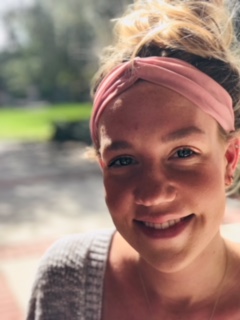By Katherine Hamilton | gargoyle@flagler.edu
Jessica Schake sat cross-legged, with wide blue eyes and lifted brows, tugging at the string of her heather gray sweatshirt as she talked about her plans for the future. A junior and transfer at Flagler College, she is majoring in media with a minor in film and is intrigued by the relevance and fast pace of her field.
“I could definitely see myself being in the advertising department of some company or managing social media platforms for people,” Schake said.
 However, an inherited disease challenges her love of the visual arts. Approximately four years ago, she was diagnosed Retinitis Pigmentosa, an incurable eye disease that causes everyday challenges and can lead to progressive eyesight loss.
However, an inherited disease challenges her love of the visual arts. Approximately four years ago, she was diagnosed Retinitis Pigmentosa, an incurable eye disease that causes everyday challenges and can lead to progressive eyesight loss.
“There is that fear in the back of my mind that if I do this the rest of my life, the visual aspect of things…what if my vision ends up getting worse?” Schake said. “It’s kind of an intimidating thought, but the curiosity of wanting to explore more outweighs the fear.”
She never noticed anything unusual about her eyesight before she was diagnosed and only had her vision checked because her brother and many of her other relatives have the disease. After she was told she has Retinitis Pigmentosa, she realized that certain aspects of her vision had been anything but normal.
“When I was younger, and we would play hide-and-go-seek outside with our neighborhood friends, I was always conscious of where I was walking,” Schake said. “I never felt comfortable running in the dark because I thought, ‘I can’t see. My eyes won’t adjust.’”
Some of her symptoms include difficulty seeing at night, eye strain, trouble adjusting to different lights, unclear images in her peripheral from the waist-down, and the possibility of little to no sight in the future.
She moved her hands up to her eyes and wrapped her fingers around in circles like she was looking through a pair of binoculars, physically describing the future of her eyesight.
“What it will eventually be is like tunnel vision,” Schake said.
Since diagnosis, she goes for treatment at a little log cabin in Beaver, West Virginia. Her doctor has been treating different eye diseases for over 30 years.
She goes to treatment once or twice a year, for a week at a time, five times a day, twenty minutes each and with an hour in between sessions. The treatment is very painful.
“It’s acupuncture in my hands and then my feet,” Schake said. “There are certain pinpoints that create blood-flow to my eyes.”
Despite the discomfort of the treatment, and the fact that her sessions are scheduled during her winter and summer breaks, her whole family makes an occasion of going out of town. She has also been able to meet a community of people going through similar issues and has derived encouragement from the relationships she has formed.
“We don’t all have the same eye disease or circumstance, but it’s a common denominator that we are all here for one reason,” Schake said.
One woman she met at the clinic is lives in New York with her two children, takes the subway to work every day and works in an office. She does all of this completely blind.
“It’s very encouraging to see people who are continuing on with their lives even though they are so much worse than I am,” Schake said. “I am appreciative of the people I’ve met through treatments.”
Schake said she feels blessed to have been born into a family that’s able to help her receive the treatments she needs. The treatments are extremely expensive and annual, so not every person with Retinitis Pigmentosa can afford to get help.
“Sometimes I ask myself why I was given the opportunity at such a young age to have the treatment that I do and the preventative measures that I do and not another person,” Schake said. “Someone who is far more blind than I will ever be.”
Overall, she says the disease hasn’t gotten in the way of her life so far, and she’s grateful her sight isn’t worse than it is. Even though she is hopeful for the future, she is still plagued by the possibility that she might not always be able to see the world around her.
“It’s definitely in the back of my mind all the time,” Schake said.
Her fear, she noted, will not keep her from living her life. Her experience has shown her a different perspective—the importance of gratitude.
“I’m thankful that I was born with vision,” Schake said. “Even though the disease is something that I’ve seen in my family get progressively worse, I’m thankful I have a family who wants the best for me.”



Be the first to comment on "Uncertain vision: Media student’s eye disease could pose challenge"